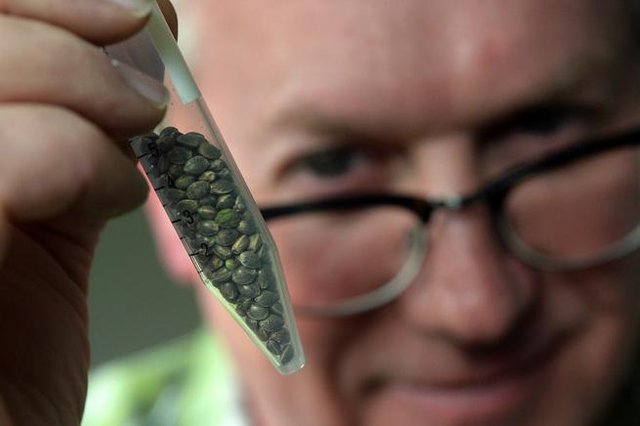Why does the U.S. government holds a patent on cannabis plant compounds?

Marijuana proponents allege that the U.S. government is exhibiting hypocrisy by owning a cannabis-related patent while also denying marijuana's rescheduling. Pictured: In this 2014 file photo, Lafayette-based Centennial Seeds seed developer Ben Holmes displays his Otto II seeds, a high-cannabinoid strain of hemp he hoped to patent in the coming year. (Denver Post file)
What Patent No. 6,630,507 means to the marijuana industry
Following the U.S. Drug Enforcement Administration’s inaction on rescheduling marijuana, legalization proponents have responded by taking to the internet to highlight Patent No. 6,630,507 — telling the DEA to “talk to the hand” by writing “6,630,507” on their palms, hashtagging the number and linking to past articles on the topic.
Since not all Americans are intimately familiar with patents — and because of the reams of misinformation out there regarding this patent in particular — here’s a handy explainer about Patent No. 6,630,507:
U.S. Patent No. 6,630,507 covers the potential use of non-psychoactive cannabinoids — chemical compounds found within the plant species cannabis sativa — to protect the brain from damage or degeneration caused by certain diseases, such as cirrhosis.
U.S. Patent No. 6,630,507 was granted to the U.S. Department of Health and Human Services in 2003.
The recent social media flurry has consisted of posts varying in allegations and accuracy — some have claimed that the government patented the marijuana plant in its entirety. But the overall intent is one that is symbolic in nature, said Sam Mendez, an intellectual property and public policy lawyer who serves as the executive director of the University of Washington’s Cannabis Law & Policy Project.
“Naturally, it shows that there is a certain amount of hypocrisy that there is ‘no accepted medical use’ for cannabis according to federal law,” Mendez said. “And yet here you have the very same government owning a patent for, ostensibly a medical use for marijuana.
“It’s certainly hypocritical, but there’s no laws against doing so.”
Mendez, patent lawyers, the research arm of the HHS and the New York biopharmaceutical firm that’s working as an exclusive licensee under the patent also caution that the existence of Patent No. 6,630,507 isn’t necessarily so black and white.
“(The federal government is) a very large organization with hundreds of thousands of federal employees and innumerable number of departments,” he said. “It’s much more complicated than to think about them as a single organism. … The government is allowed to file and obtain patents, and that has no bearing on the Controlled Substances Act.”
More broadly, the existence of Patent No. 6,630,507 shines a light on what could result from legalization — an explosion of marijuana-related patents, he said.
No. 6,630,507’s inception
The National Institutes of Health has roughly 6,000 doctoral-level scientists in its employ, working mostly in Maryland, said Mark Rohrbaugh, who holds doctorates in biochemistry and law and is special adviser for technology transfer at the NIH. When one of those scientists invents a new technology or makes a new discovery, the NIH evaluates the result and determines whether to file for a patent.
Hey gryphene, thank you for sharing. But instead of copy/pasting a full article's text, please only include a portion of it (like the first paragraph) as a quote using the markdown code: > Quoted paragraph and then follow it with the original link. Including the entire article's text is kind of like stealing from the original author, and it's often discouraged here with downvotes.
Also consider using a related image as thumbnails go a long way in making posts stand out in the post list. @steemcleaners
http://www.thecannabist.co/2016/08/22/marijuana-patents-6630507-research-dea-nih-fda-kannalife/61255/
Downvoting a post can decrease pending rewards and make it less visible. Common reasons:
Submit